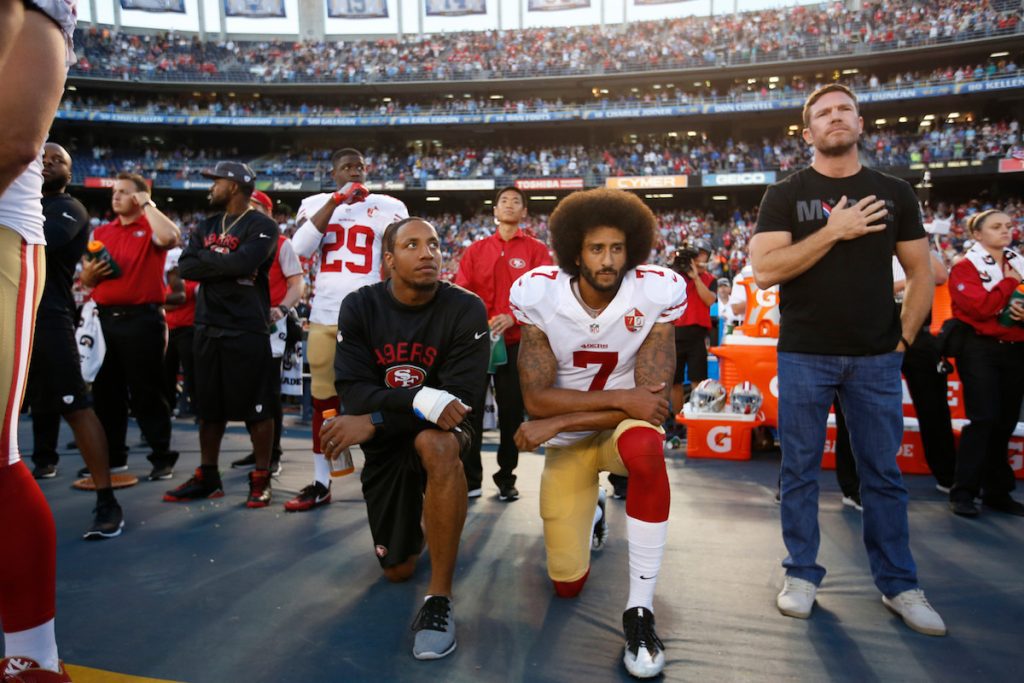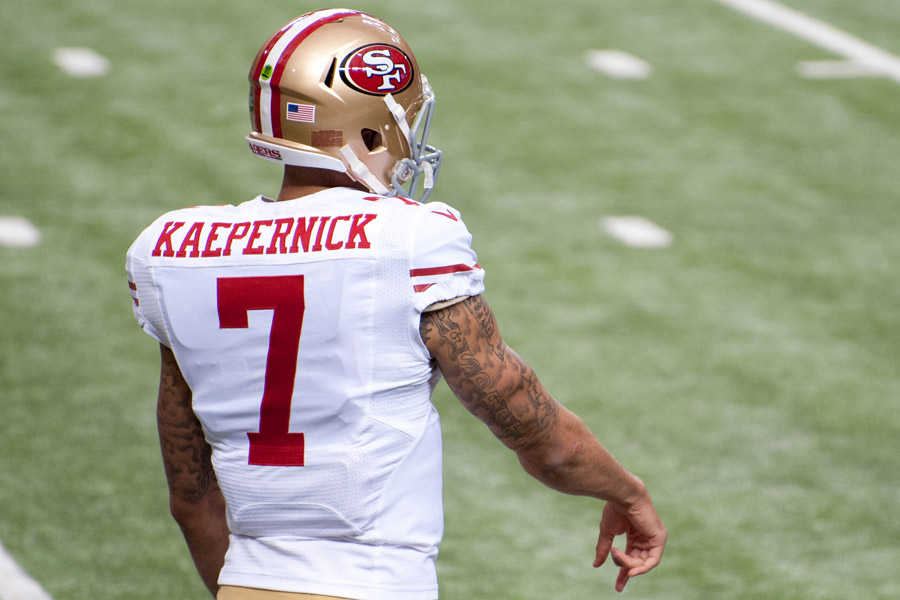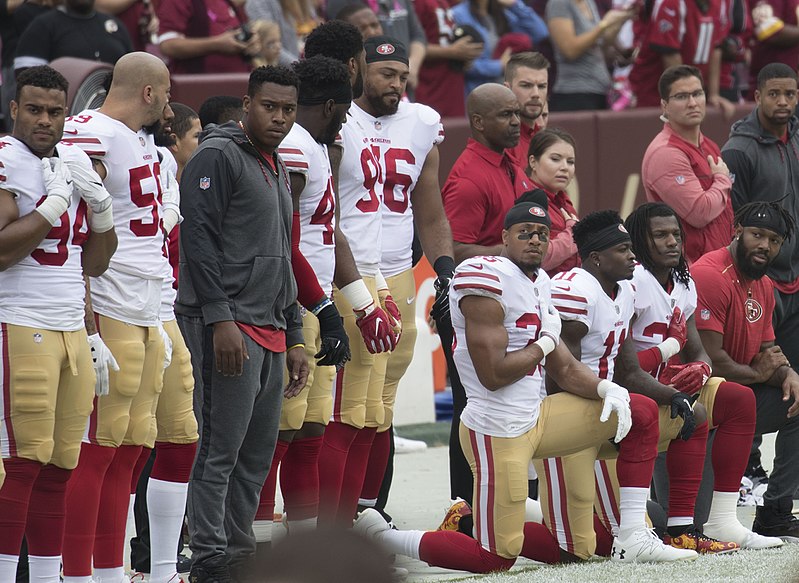A LITTLE MORE THAN A WEEK AGO, THE NFL SIGNED OFF ON A NEW POLICY TO INTERCEPT NATIONAL ANTHEM PROTESTS BEFORE THEY HAPPEN.
Written by Chris Metler
Bombastically spearheaded by U.S. president Donald Trump, who dubiously deemed it a matter of patriotism, the measure mandates that players on the field must be upright for “The Star-Spangled Banner.” Should they sit or kneel – as several have done in protest of police brutality and racial prejudice in recent seasons, particularly after quarterback Colin Kaepernick’s initial kneeling protest in 2016 captured global attention – their respective teams could be fined or further punished by the league.
Sure, it must be noted that these players — and other personnel, too — can remain in the locker room if they choose. But, frankly, what really stands out here (no pun intended) is the NFL flagrantly contradicting their so-called commitment to advancing social justice and promoting positive social change.
Should we even be surprised, though? Truth be told, it appears to be just the latest effort to diminish today’s professional athletes as credible agents of social change.


Shut up and dribble
It was only in February that LeBron James made related headlines, claiming Trump doesn’t “give a f*ck about the people.” Sure enough, the reaction to King James’ comments were swift and polarizing. And in keeping with the profanities, it was conservative television and radio talk show host Laura Ingraham’s response to the NBA superstar that arguably stirred up the biggest proverbial sh*tstorm.
Shut up and dribble, she advised. The blunt, thinly-veiled insinuation was that professional athletes should refrain from such charged political and social commentary, despite so many sportsmen and women becoming active in both. And at a level not seen in ages, either.
Ummmmm… have outspoken detractors like Trump and Ingraham conveniently forgotten that professional athletes making these kinds of statements is as old as time itself?
The 20th century alone saw Branch Rickey and Jackie Robinson break baseball’s colour barrier in 1946, when Rickey — general manager and president of the Brooklyn Dodgers — signed Robinson to a minor league baseball contract. Not only did this decision confirm Robinson as the first African-American to play professional baseball in nearly half a century, but even came eight years ahead of Rosa Parks refusing to give up her bus seat to a white passenger in the ‘coloured section’.
Or consider how, in 1967, boxer Muhammad Ali evolved into the most famous professional athlete ever to make a major political statement when he declined induction into the Vietnam War based on his declared opposition to it, as well as his beliefs as a Muslim. The reigning heavyweight champion of the world, Ali was arrested and found guilty of draft evasion, then stripped of his title and suspended from the sport for three long years. His decision to refuse enlistment subsequently became a lighting rod for debate about the conflict in Vietnam.
Or, just one year later, when 1968 produced one of the most iconic images in the annals of sport: American track-and-field stars Tommie Smith and John Carlos perched atop the medal podium at the Olympics, their heads bowed during a rendition of the aforementioned American anthem, right hands raised to the sky and fists clenched in dissent. The two were protesting the treatment of black Americans and other minorities back home. In turn, they were booed, expelled from the Mexico City Games and widely criticized.
Even the Olympics themselves have long provided a platform for individuals and countries alike to express their outcry. This goes back to the 1908 London Games, where Irish competitors boycotted the international sporting event in retaliation to Britain’s failure to grant Ireland independence. And who can forget when the United States led 62 countries in spurning the 1980 Olympics in Moscow — a counter to the Soviet Union invading Afghanistan in 1979?
Despite the anti-kneeling and shut up and dribble contingents — or what have you — evidently too dense to realize it, the impact of these bygone political and social statements has been immeasurable.
Sports as a political act


Within ten years of Jackie Robinson’s breakthrough, black Americans were freely able to participate in baseball at its highest levels. In fact, it’s remembered as one of the most important moments in the history of American sport, if not the country itself.
And although the majority of Americans initially challenged Muhammad Ali’s refusal to serve, the ring legend’s stance took on a more romantic position over the succeeding decades. It’s now considered the foremost instance of a public figure — let alone a professional athlete — standing up against war and for their ideals.
Sports Illustrated even once reported that the photograph of Tommie Smith and John Carlos’ Black Power salute had become the most reproduced photo in Olympic history. How’s that for delivering a timeless message?
These immense examples — combined with countless others — have since stood for generations to study and admire. Which means modern professional athletes like Colin Kaepernick and LeBron James are well within their right to follow their lead.
Take Venus Williams fighting for gender equality at Wimbledon upon her 1998 debut. Or Carlos Delgado railing against the Afghanistan and Iraq Wars by refusing to stand for God Bless Americain 2004. Or Pat Tillman leaving the NFL for the U.S. Army that same year. Or the Phoenix Suns demonstrating against Arizona’s immigration laws in 2010. Or Andrew Hawkins’ t-shirt protest for Tamir Rice and John Crawford.
The list goes on — and so it should!
For better or worse, professional athletes wield more cultural influence than ever before. Their objections today may come to inspire the changes of tomorrow. In a world that’s reeling from politics of divisiveness — where heated racial and social issues are permeate the mainstream like clockwork — their voice is one that still deserves to be heard.
It’s maybe high time for critics like Trump and Ingraham to realize those who cannot remember the past are condemned to repeat it. What’s more, that these professional athletes aren’t protesting the flag or the anthem — or their country itself. They are protesting injustice.








